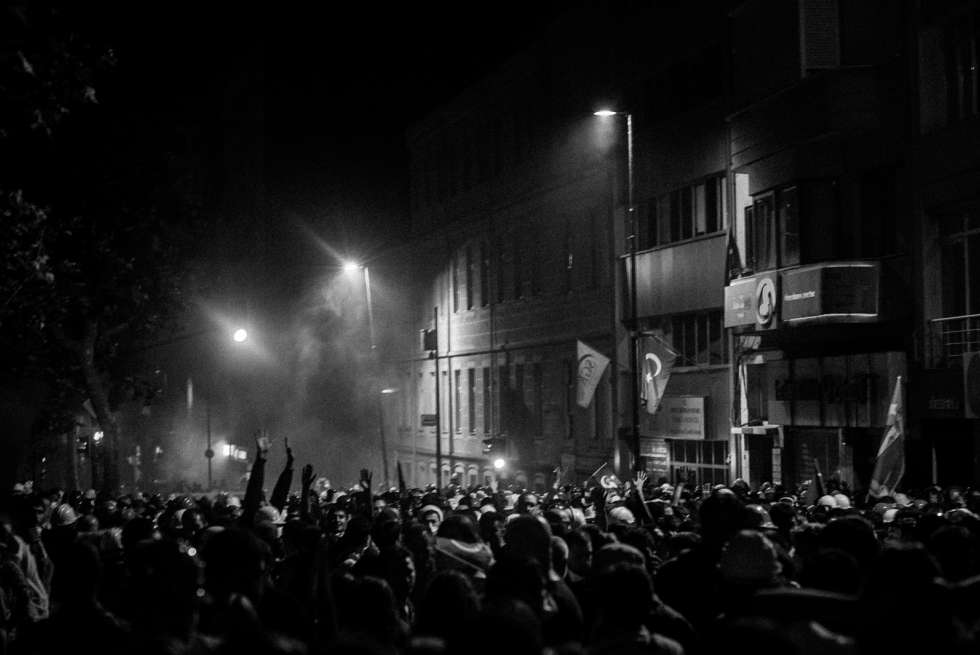
This Hot Spots series addresses the antigovernment protests that first sprang up in Gezi Park, Taksim, in Istanbul in the summer of 2013, and later spread to much of Turkey. The brief essays presented here each approach this uprising from a different angle, trying to decipher the new social forms that Gezi Park generated. These protests pushed anthropologists to think outside the box in their efforts to understand the event, moving beyond older frames of analysis. The series editors, Umut Yildirim and Yael Navaro-Yashin, each provide an introductory editorial.
Posts in This Series

Editorial—An Uprising on the Verge of Comparison
Just three days after tens of thousands of people took to the streets in various cities across Turkey in opposition to the authoritarian government on May 31, 2... More

Editorial—Breaking Memory, Spoiling Memorization: The Taksim Protests in Istanbul
The government of Turkey wanted to refashion Taksim Square, the public space most symbolically representative of the foundation of the Republic of Turkey. Prime... More

Masculinized Power, Queered Resistance
On the morning of July 1, exhausted from the first night of clashes with the riot police but still upbeat, the crowd of young male soccer fans with eyes red fro... More

The What of Occupation: “You Took Our Cemetery, You Won’t Have Our Park!”
Retrospectively, it became a foreboding. Or, in other words, reality came to grimly echo the creative intervention of an Armenian youth group in Gezi Park. Shor... More

The Politics of Visibility
Politics is not merely about logos. The “partition of the sensible” divides bodies into two categories, “those that one sees and those that one does not see, th... More

On the Fantasy of Dispossession
From the balcony of a building overlooking Istiklal Street, Ali was joyfully waving to the massive crowd of people marching underneath and chanting slogans in T... More

On the Joy and Melancholy of Politics
On May 31, 2013, the boat approaching the Kabataş pier on the European side of Istanbul was packed with fellow-travelers who were nervously fiddling with their ... More

The Politics of Humor and Humor as Politics during Turkey’s Gezi Park Protests
Can humor be the language of resistance when “resistance” also means people being tear gassed, shot at, blinded, and killed by the police and counter-demonstr... More

A Look at Gezi Park from Turkey’s Kurdistan
“Pardon me! But where do you mean by Kurdistan?” Deniz rhetorically asked Ali, who happened to drop the word Kurdistan in a conversation on the Gezi protests in... More

Kissing the Mahrem in Ankara
On May 25, 2013, Ankara’s Kurtuluş subway station witnessed Turkey’s first kissing protest. The demonstration was called in response to a public announcement on... More

Improbable Encounters: Marching for Lice in Kadıköy
On the evening of June 28, 2013, a group of several-thousand people marched through the streets of Kadıköy, a neighborhood on the Asian side of Istanbul that ... More

Protest and the Limits of the Body
Even the most fleeting visitor to the occupied Gezi Park between May 28 and June 15, 2013, could tell that those three weeks of commune-like existence were sust... More

Suspending the Limits of the Sayable . . .
“The only means left to us is the ‘word.’ They covet that as well.” —Arat Dink, 2010 Much has been made of the creativeness displayed during the Gezi protests,... More

What Is Queer about Gezi?
Near sunrise on May 31, 2013, the Istanbul police forcefully entered Gezi park, shattering and burning the tents and belongings of a few protestors who had occu... More

Nefes: Notes on Breath
“Not like a theft, not like a sudden assault—vast occupations do not take place like that, abruptly; they are the consequence of long-term work, as you know. ... More

Shadows of the 1980 Coup and the Syrian War: Resisting in Antakya
“Here the resistance is unlike Istanbul,” said Ercan, a young Arab Alevi man from Antakya, a town in South Turkey that has experienced the repercussions of th... More

The Soil Does Not Have History
“The soil does not have history”—uttered the leader of the APK council members at a meeting in the City Hall of Fatih municipality. The meeting with the local... More

“Ghosts” of a Situationist Protest, Deadly Edges of Kemalism
Ali İsmail Korkmaz was one of the six protestors killed during the Gezi park events. A group of young people recited a text about Korkmaz’s death, written in ... More